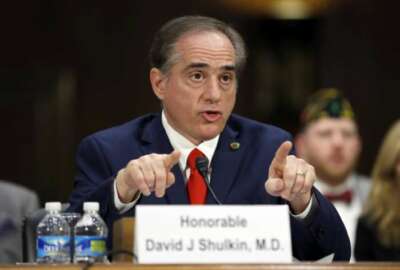

Congress wants the Veterans Affairs Department to expand acquisition internship program and start using the same requirements to report cost savings from...
Veterans affairs congressional committees have been busy this year, passing new accountability legislation and finalizing details to change the outdated veterans appeals process.
Now, lawmakers are beginning to turn their attention to some of the more nitty-gritty challenges facing the Veterans Affairs Department.
VA, however, doesn’t see the need for new legislative fixes, or at least, not these particular suggestions related to the department’s training and onboarding for acquisition professionals, as well as its procurement reporting standards.
But Congress, long frustrated by VA’s lengthy contracting processes and the scheduling and cost overruns it’s seen with major construction projects in the past, isn’t convinced the department can more effectively manage the procurement process and staff its offices properly without new legislation.
One bill would require VA logistics and construction professionals to go through training and receive certification for each General Schedule pay grade. It would also ask VA to prioritize internship programs to onboard more entry-level acquisition professionals.
VA currently requires training for its contracting officials, but not for logistics and construction professionals.
VA already has a few different internship programs, including the Warriors to Work Program and Acquisition Intern Program, but the bill suggests the department use them more frequently. VA has already expanded the internship programs in the past, given the department’s workload, Tom Burgess, associate deputy assistant secretary for the Office of Logistics and Supply Chain Management within VA’s Office of Acquisition and Logistics, said.
“We need these young people to replace the older employees, who are retiring in greater numbers every year,” Rep. Bruce Poliquin (R-Maine), the bill’s sponsor, said during a House VA Oversight and Investigations Subcommittee hearing June 29. “It takes a long time … for everybody in these jobs to learn how these contracting regulations work and how construction management and how supply chains operate. We need to plan for the future and grow our talent from within. It’s time to use these intern programs as best we can to the maximum extent possible.”
The bill would require VA to at least double the number of acquisition interns it puts through the program. The department, however, said it doesn’t want to be bound to specific requirements about the number of interns it accepts.
Burgess said about 30 interns will graduate from the VA’s Acquisition Intern Program this year. But the department has about 2,500 open contracting positions.
“It seems like you need more bodies, right?” Poliquin said.
“We always are searching for quality contracting officers,” Burgess said. “The interns we’ve graduated today account for about 10 percent of our contracting workforce.”
With those numbers in mind, lawmakers can’t understand why VA wouldn’t want to pass more interns through its program.
“I don’t think it would hurt,” Wayne Simpson, a former VA employee and member of the National Veterans Small Business Coalition. “[With] the example of how construction management handled the facility, perhaps if those professionals had been trained a little bit better they might have prevented that from happening.”
To pay for these initiatives, Congress wants the department to develop a plan that streamlines VA acquisition functions and decentralizes procurement and logistics activities at the central office.
Specifically, the bill suggests VA reorganize functions at the Veterans Health Administration’s Procurement and Logistics Office and the department’s Office of Acquisition, Logistics and Construction and relocate procurement and logistics officers to individual VA medical facilities where the supplies and services are actually getting used.
VA could also “achieve cost savings through attrition, redistribution of functions or duties in an organization, or a transfer of a function,” but it may not use furloughs or demotions, the legislation said.
The subcommittee is also considering the VA Procurement Efficiency and Transparency Act, which would require all of the department’s acquisition functions to document cost savings from procurements in the same way. The database would keep track of the average bids and winning bids for each procurement activity.
“There is no uniformity in how the savings are calculated, or if they are recorded at all,” said Rep. Mike Coffman (R-Colo.), the bill’s sponsor. “In fact, individual offices seem to determine these numbers according to each office’s own policies.”
Again, VA said it didn’t see the need for new legislation, nor the requirement that VA consistently track procurement-related cost savings.
“This process is not required by the Federal Acquisition Regulation, nor does it appear to be a requirement for any other federal agency,” Burgess said. “VA’s procurement process is not unique and should not be treated as such by imposing this requirement on the agency.”
Yet some lawmakers and veterans service organizations were disappointed with VA’s response.
“Everyone else not having to do it is not an acceptable excuse,” said Patrick Murray, associate director of the national legislative service for the Veterans of Foreign Wars.
Copyright © 2025 Federal News Network. All rights reserved. This website is not intended for users located within the European Economic Area.
Nicole Ogrysko is a reporter for Federal News Network focusing on the federal workforce and federal pay and benefits.
Follow @nogryskoWFED

